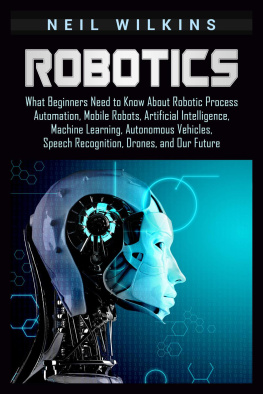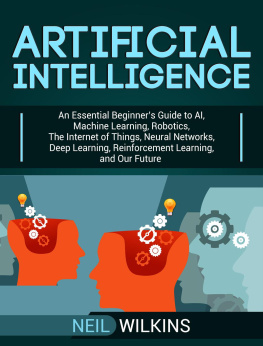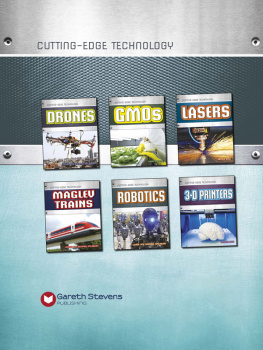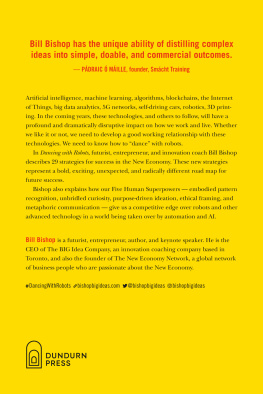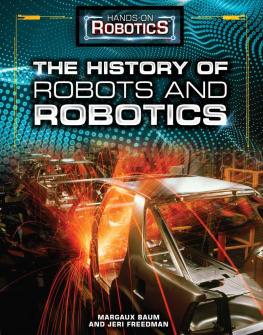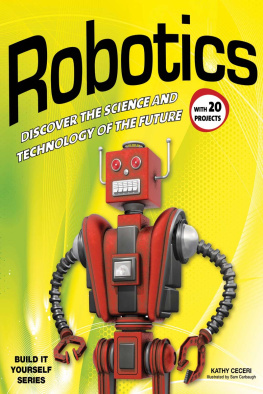Neil Wilkins - Robotics: What Beginners Need to Know about Robotic Process Automation, Mobile Robots, Artificial Intelligence, Machine Learning, Autonomous Vehicles, Speech Recognition, Drones, and Our Future
Here you can read online Neil Wilkins - Robotics: What Beginners Need to Know about Robotic Process Automation, Mobile Robots, Artificial Intelligence, Machine Learning, Autonomous Vehicles, Speech Recognition, Drones, and Our Future full text of the book (entire story) in english for free. Download pdf and epub, get meaning, cover and reviews about this ebook. year: 2021, publisher: Neil Wilkins, genre: Romance novel. Description of the work, (preface) as well as reviews are available. Best literature library LitArk.com created for fans of good reading and offers a wide selection of genres:
Romance novel
Science fiction
Adventure
Detective
Science
History
Home and family
Prose
Art
Politics
Computer
Non-fiction
Religion
Business
Children
Humor
Choose a favorite category and find really read worthwhile books. Enjoy immersion in the world of imagination, feel the emotions of the characters or learn something new for yourself, make an fascinating discovery.
- Book:Robotics: What Beginners Need to Know about Robotic Process Automation, Mobile Robots, Artificial Intelligence, Machine Learning, Autonomous Vehicles, Speech Recognition, Drones, and Our Future
- Author:
- Publisher:Neil Wilkins
- Genre:
- Year:2021
- Rating:5 / 5
- Favourites:Add to favourites
- Your mark:
Robotics: What Beginners Need to Know about Robotic Process Automation, Mobile Robots, Artificial Intelligence, Machine Learning, Autonomous Vehicles, Speech Recognition, Drones, and Our Future: summary, description and annotation
We offer to read an annotation, description, summary or preface (depends on what the author of the book "Robotics: What Beginners Need to Know about Robotic Process Automation, Mobile Robots, Artificial Intelligence, Machine Learning, Autonomous Vehicles, Speech Recognition, Drones, and Our Future" wrote himself). If you haven't found the necessary information about the book — write in the comments, we will try to find it.
Are you curious about robotics?
Perhaps you want to take advantage of robot-based technology for your business or household?
Or you simply want to know how artificially intelligent machines, drone technology and self-driving vehicles will shape the coming times?
If you want to learn the basics of artificial intelligence and modern robotics, then keep reading!
Robotics are slowly creeping into our lives. From voice recognition and to machine-learning driven algorithms, robots and artificial intelligence are slowly gaining prominence. In a few more years, autonomous robots and machine learning will be everywhere.
With the right knowledge, you can make the most of the robotic evolution and survive the shocking changes about to come. You can better understand the truth about robotics, reboot your artificial intelligence knowledge and understand the problem of control.
This book offers a comprehensive look at the pros and cons of robotics, automating the robotic process, self-driving vehicles, drone applications and robotic operating systems.
In this book, you will learn everything you need to know about robotics as a beginner:
Imagine being able to confidently use intelligent robots and autonomous agents to your advantage or having the leading edge when it comes to planning and controlling robots! Youll be better placed to improve your value in the workplace or in business!
Whether youre a complete beginner, a robotics enthusiast or seasoned Raspberry Pi 3 or Python programmer, theres something in this book for you!
Ready to master the fundamentals of robotics and how robots can shape your future? Then get this book now!
Neil Wilkins: author's other books
Who wrote Robotics: What Beginners Need to Know about Robotic Process Automation, Mobile Robots, Artificial Intelligence, Machine Learning, Autonomous Vehicles, Speech Recognition, Drones, and Our Future? Find out the surname, the name of the author of the book and a list of all author's works by series.

